Respect for Human Rights
Basic Views
We promote management that respects human rights, identifying "Respect People" as one of the core values in our "Business Principles".
With the globalization of our business, we have become increasingly aware of the importance of respecting human rights throughout the entire value chain. In response, we have established the “Human Rights Policy for the Sumitomo Heavy Industries Group” and are strengthening our Group-wide initiatives to promote respect for human rights.
Human Rights Policy for the Sumitomo Heavy Industries Group
In February 2023, we established the “Human Rights Policy for the Sumitomo Heavy Industries Group” through a resolution of the Board of Directors, and revised it in July 2025.
The latest revision clearly affirms our commitment to implementing the Ten Principles of the United Nations Global Compact, further reinforcing our Group-wide initiatives to promote respect for human rights.
This policy was developed with input from external experts and NGOs, and references international standards such as the United Nations “Guiding Principles on Business and Human Rights” as well as guidelines issued by Japan’s Ministry of Economy, Trade and Industry. *
* “Guidelines on Respecting Human Rights in Responsible Supply Chains,” formulated in September 2022.
- 1Basic Concept
We, the Sumitomo Heavy Industries Group, engage in business activities through a strong sense of mission for society, under our corporate ethics, which are based on “Sumitomo’s Business Philosophy” as well as the Sumitomo Heavy Industries Group’s “Purpose” and “Business Principles”.
We have been manufacturing and repairing machines and equipment used at the Besshi Copper Mine, where Sumitomo Group originated, as one of our core businesses, and with our unique technological capabilities, we have contributed to the improvement of the labor environment through mechanization.
We will remain sincere in our approach to all our stakeholders and engage in the strongest possible efforts related to respecting human rights.
In this policy, stakeholders include our employees, customers, business partners, regional populations, shareholders and investors, etc. - 2Role of This Policy and Scope of Application
This policy is a top-level policy on human rights that applies to all executives, employees, and dispatched employees engaged in work for the Sumitomo Heavy Industries Group businesses (hereinafter, “Executives and Employees, etc.”).
In addition, we believe that it is important to implement this policy with all of our business partners such as our customers and business partners. We will ensure that our business partners understand and implement this policy, guidelines for procurement, and other matters as we realize our responsibilities to society together. - 3Compliance with International Standards, Laws, and Regulations
Throughout our business activities, we will support and conform with international standards defined in consideration of respect for basic human rights that all people across the world should be able to enjoy. (These include the UN’s “International Bill of Human Rights”, and “Guiding Principles on Business and Human Rights”, the ILO’s “Declaration on Fundamental Principles and Rights at Work” and “OECD Guidelines for Multinational Enterprises”.)
In addition, we will implement the ten principles of the UNGC (United Nations Global Compact), fulfilling our responsibilities with respect to the four defined categories of said compact: human rights, labor, the environment, and anti-corruption.
Moreover, we will strive to implement a thorough compliance with the laws and regulations of the countries and regions in which we conduct our business activities.
If there is a discrepancy between the laws and regulations of the country or region where we operate and international human rights norms, we will pursue ways to remedy the problem in accordance with higher standards. - 4Responsibility for Respecting Human Rights
We understand that our business activities may adversely affect human rights directly or indirectly. We endeavor to realize our responsibility to respect human rights by giving the maximum possible consideration to how we will not infringe upon the human rights of our stakeholders and to take appropriate actions to that end.
(1) Prohibition of discrimination We will not tolerate discrimination in any form, including discrimination based on age, nationality, race, ethnicity, place of origin, religious affiliation, creed, political beliefs, marital status, family structure, gender, sexual orientation, gender identity, disability, or employment status.
(2) Prohibition of harassment We will not allow acts of harassment of any kind that harm the dignity of an individual, such as sexual harassment and power harassment, and will seek to establish an organizational culture with good communication oriented towards ensuring psychological security.
(3) Promotion of diversity We consider the promotion of diversity to be a major theme of management, and will respect the diverse characteristics present among individuals, maintaining a workplace that values mutual respect and where anyone can be motivated to work without having to sacrifice who they are.
(4) Respect for freedom of association and the right to collective bargaining We respect workers’ freedom of association and their rights regarding collective bargaining. Further, we will ensure that workers are not disadvantaged by their participation in legitimate labor movements and that a fair and impartial relationship between labor and management is established.
(5) Prohibition of forced labor,
child labor, and similar actsWe will not tolerate human trafficking; forced labor through violence, threats, or debts; child labor; or modern slavery.
(6) Provision of a safe and healthy working environment We will actively engage in matters related to occupational safety and health, providing an environment in which safety and health are easily maintained during work and in which no disasters or accidents occur.
(7) Payment of suitable wages In addition to respecting the laws and regulations concerning wages in the countries and regions in which we do business, we will define compensation that is sufficient as a basic living wage and pay according to such definitions.
(8) Management of work time We will appropriately manage working hours based on the applicable laws and regulations and promote systems that ensure sufficient holidays and vacation days.
- 5Human Rights Due Diligence
We will act in accordance with the UN Guiding Principles on Business and Human Rights, working together with third-party organizations to implement human rights due diligence on an ongoing basis.
Through these activities, we will identify negative impacts on human rights and take steps to prevent or mitigate such impacts. - 6Dialog
We will actively engage in dialog and consultations with our stakeholders in an effort to improve our efforts related to the respect of human rights.
- 7Encouragement of Training and Understanding
With respect to our Executives and Employees, etc., we will conduct ongoing training to ensure that this policy is sufficiently implemented throughout the business activities of the Sumitomo Heavy Industries Group.
We will also actively establish information-sharing and cooperative opportunities with our business partners to ensure that the promotion of respect for human rights is present throughout our entire supply chain. - 8Access to Remedy
If we identify any cases where our business activities have adversely affected human rights directly or indirectly, we will promptly pursue actions to provide remedy through the appropriate measures and endeavor to rectify the situation together with our business partners, if necessary. Throughout this process, we will prohibit any disadvantageous treatment such as reprisals against whistleblowers and protect any such persons.
- 9Information Disclosure
We will regularly disclose information, through channels such as our company website or reports, regarding the progress of our efforts to respect human rights described in the provisions of this policy.
Human Rights Management Structure
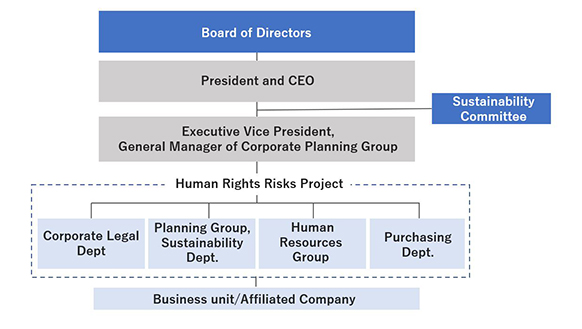
Our human rights initiatives are overseen by the Board of Directors, with the Executive Vice President and General Manager of the Corporate Global Strategy Group responsible for promoting these efforts.
The status of these initiatives is discussed at meetings of the Sustainability Committee, and the outcomes are regularly reported to the Board of Directors twice a year.
We launched a company-wide “Human Rights Risk Project” and are advancing initiatives to promote respect for human rights based on the action plans developed through this project.
Participation in the UN Global Compact
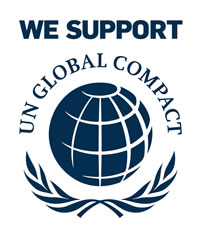
In January 2025, we declared our support for this initiative. Taking this opportunity, we will work together with our stakeholders to further strengthen responses in line with global standards, fulfilling our role as a responsible member of the international community.
Human Rights Due Diligence
As part of our efforts to identify, prevent, and mitigate adverse impacts on human rights—based on the United Nations “Guiding Principles on Business and Human Rights“—we are implementing initiatives across multiple priority levels, with a particular focus on high-risk areas.
Human Rights Risk Identification Process
We have established global supply chains and manufacturing sites around the world.
To protect workers’ human rights from a global perspective, we have defined and identified relevant human rights risks.
| Target | Human rights risk identification process | |
|---|---|---|
| SHI Group | Based on an analysis using two axes — “severity of human rights risk“ and “impact on the company“ — we have identified a high level of human rights risk among foreign technical intern trainees, on-site subcontractors, and temporary employees in Japan. | |
| Japanese supply chain | Identifying suppliers with a high “ratio of sales for the Company” and a large “number of foreign employees” as potential high-risk suppliers. | |
| Overseas supply chain | Identifying suppliers located in regions with high “labor intensity” and low “regional wage levels (GDP per capita)” as potential high-risk suppliers. | |

Human Rights Due Diligence Approaches in 2024
| Initiatives | Results and challenges |
|---|---|
| Work environment surveys We conduct work environment surveys covering workers in our Group’s supply chain in collaboration with The Global Alliance for Sustainable Supply Chain (called ASSC below). 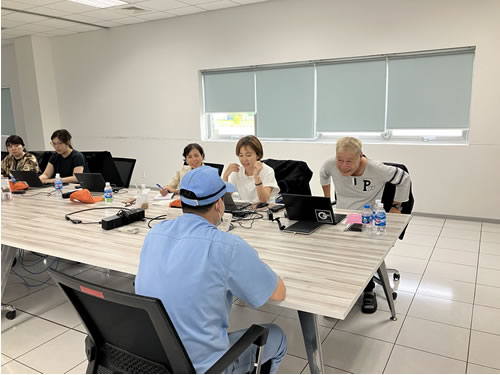 |
Survey subjects
Results and challenges No serious issues were identified that posed a threat to human life or required immediate protective action. However, an employment contract clause requiring employees to continue working after returning from overseas assignments was discovered. As a result, our Group’s relevant factories deleted the provision and initiated a review to ensure proper correction. |
| Respecting the human rights of subcontractors and temporary employees on our premises We assign priorities and take action to obtain human rights pledges from on-site subcontractors and to sign memoranda of understanding with temporary employment agencies to ensure respect for human rights. |
Survey subjects human rights due diligence was conducted at Chiba Works and Ehime Works, two of our major manufacturing sites. Results and challenges Through this initiative, we are committed to eliminating adverse human rights impacts and thoroughly promoting the development of a comfortable and inclusive work environment. Ratio of memoranda of understanding signed with temporary employment agencies (100%)*1 Ratio of pledges received from subcontractors (93%)*2 We are prioritizing improved coverage based on the Group’s net sales and are currently considering measures such as integrating this into the existing audit system. ※1 Cumulative total as of the end of December 2024 ※2 Target implementation ratio based on net sales: 80% (Current cumulative total as of December 2024: 56.3%) |
Overview of Human Rights Due Diligence Conducted to Date
| 2021 | Launched the Human Rights Risk Project and began preparations for human rights due diligence. | |
| 2022 |
|
|
| 2023 |
|
|
Human Rights Due Diligence in the Supply Chain
■On-Site Surveys of Potentially High-Risk Suppliers in Japan
As a central action for “Building a Sustainable Supply Chain", which is one of our material issues of sustainability, we are taking initiatives to respect the human rights of foreign workers, who are more prone to human rights violation.
We have designated 24 suppliers based on the number of foreign workers they employ and their net sales proportions to our Group, labeling them as “potential high-risk suppliers.” Our goal by 2026 is to conduct on-site surveys for all these suppliers and implement corrective measures if needed.
In fiscal 2024, we surveyed eight companies and confirmed that no serious issues were identified that posed a threat to human life or required immediate protective action.
At the same time, we recommended improvements in occupational safety and health, including the proper use of personal protective equipment and clear display of evacuation routes.
| Number of suppliers surveyed | ||
|---|---|---|
| FY2023 | 7 | |
| FY2024 | 8 | |
| FY2025 (plan) | 5 | |
| FY2026 (plan) | 4 | |
■On-Site Surveys of Overseas Suppliers
Overseas, we conduct surveys of our suppliers located in regions where our Group operates factories and other business sites, based on the risk analysis from our global supply chain Human Rights Risk Project.
To date, no serious issues posing a threat to human life or requiring immediate protective action have been identified. However, we have encouraged suppliers to make improvements in occupational safety and health where caution is warranted. Some of these overseas supplier surveys are conducted in collaboration with NGOs.
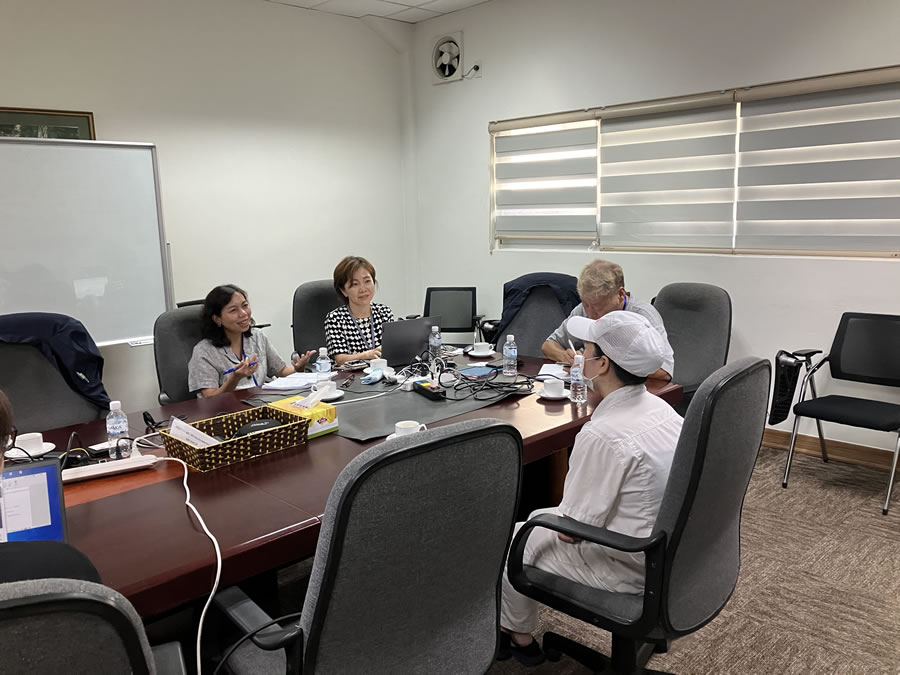
| Surveys conducted thus far | ||
|---|---|---|
| FY2023 | The Philippines | 1 |
| FY2024 | Indonesia | 2 |
| Vietnam | 3 | |
| South Korea | 4 | |
| Finland | 1 | |
■CSR Procurement Information Sessions
In fiscal year 2024, we held briefing sessions for five business divisions to promote awareness of our CSR Procurement Guidelines.
Through these efforts, we aim to advance business activities that give greater consideration to human rights, climate change, and other sustainability issues across the entire supply chain, while working toward the development of a resilient and sustainable supply chain.
Human Rights Consultation Service (Grievance Mechanisms)
We have established a dedicated consultation service for suppliers on our corporate website that affiliated personnel across the supply chain can use.
We are preparing ways to provide relief through suitable processes and information management while placing the protection of consulting parties and whistleblowers as a top priority.
Officer and Employee Training
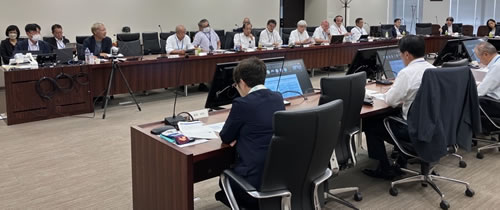
■Officer training sessions
On September 2023, we invited Masaki Wada, Director at ASSC, and held a study session titled “SHI Group’s Initiatives for Respecting Human Rights: Evaluation and Future Steps” for 39 officers and operational managers at our Group.
Participants gained a deeper understanding of human rights risks at our Group and the need for business activities that consider the impact on the supply chain.
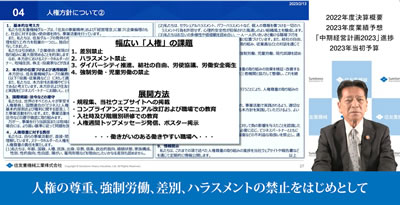
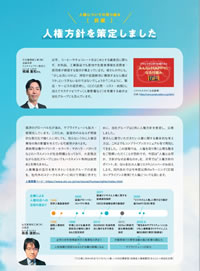
■Employee Training
As part of our human rights due diligence initiatives, we provide Human Rights Education to all employees.
We are continually conducting training and awareness-raising activities on human rights, including level-specific training, e-learning, videos from the President and CEO, and company newsletters. Through these efforts, we strive to raise employee awareness based on an understanding of global human rights issues.
In February 2023, we formulated our Human Rights Policy, and to ensure all employees understood its purpose and significance, we distributed an explanatory video from our President and CEO in three languages—Japanese, English, and Chinese.
Topics
■Work Environment Surveys in Indonesia
In April 2025, we conducted work environment surveys at two supplier companies in Indonesia. The surveys included document reviews, on-site inspections of working conditions, and interviews.
No serious issues were identified that posed a threat to human life or required immediate protective action.
However, we recommended improvements in occupational safety and health, including the proper use of personal protective equipment and the proper placement of fire extinguishers. We will continue to conduct such surveys on a prioritized and ongoing basis.
■Initiatives to Respecting the Human Rights of Subcontractors and Temporary Employees on Our Premises
As part of our human rights risk identification process, we recognize that on-site subcontractors and temporary workers in Japan face relatively high human rights risks. To address this, we are taking action to obtain human rights pledges from on-site subcontractors and to sign memoranda of understanding with temporary employment agencies to ensure respect for human rights.
We assign priorities and begin with operating divisions that conduct business within our works, as well as those that have carried out work environment surveys for technical intern trainees.
In the first half of 2025, we implemented these initiatives at one of our key works, the Yokosuka Works.
